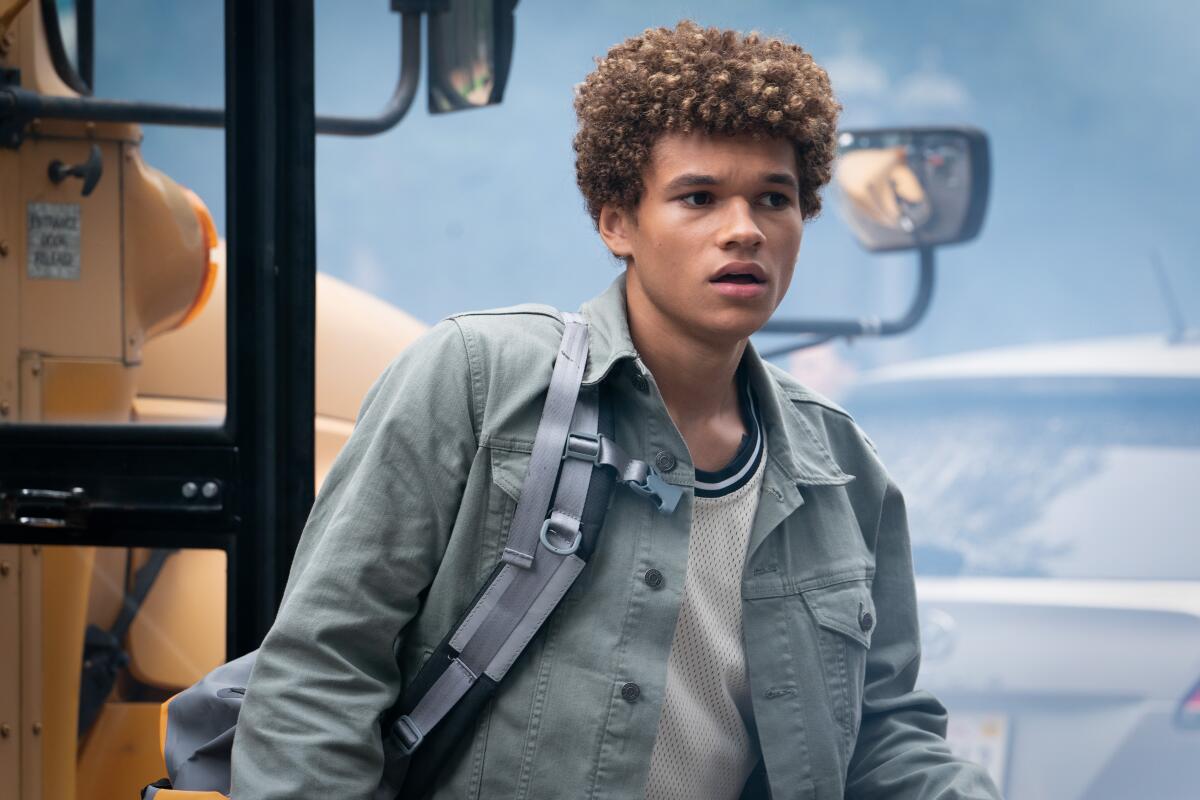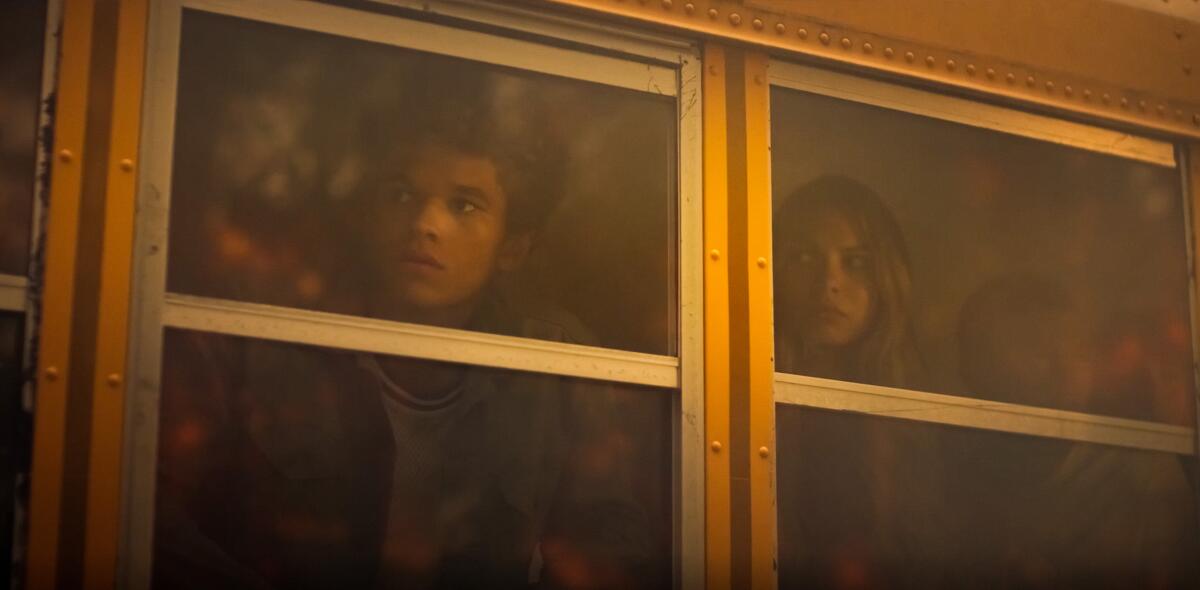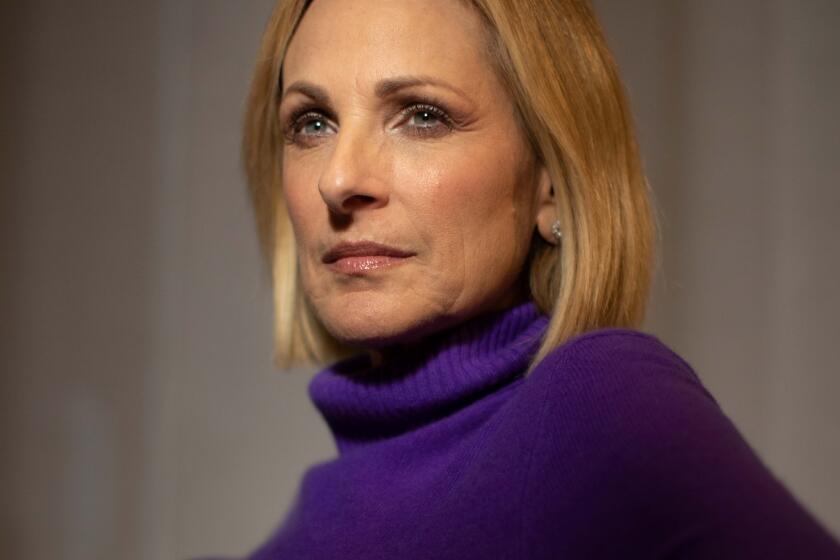Teen dramas’ track record on mental health is rough. So MTV adopted a new playbook

- Share via
The best horror and science fiction mirrors the fears of its age. In the 1950s, alien invasion films like “The Day the Earth Stood Still” were commentaries on Americans’ xenophobia and Cold War-era concerns about nuclear annihilation. “Rosemary’s Baby,” from 1968, and “The Omen,” from 1976, represented Baby Boomers’ frustrations with the societal norms of their parents. Slasher films of the 1980s took on wealth, greed and the false sense of suburban security.
Blood and guts are great. But what do they all mean?
For “Wolf Pack” — the teen drama series that premieres Thursday on streaming service Paramount+, and a follow-up to the 2010s-era MTV series “Teen Wolf’’ — creator Jeff Davis says he chose a more personal monster metaphor: “anxiety and insecurity.” (A “Teen Wolf” movie that catches up with the alphas and betas from that first series premieres in tandem with “Wolf Pack.”)
“One of the biggest issues in growing up these days is anxiety, and there are kids out there who are paralyzed by it,” Davis says.
This has, arguably, only been exacerbated by the COVID-19 pandemic. But Davis has noticed the topic popping up in his social media channels for years as more young people become comfortable talking about their mental health. It’s also something he can relate to, as he’s had depression and anxiety since he was a teenager. And it’s something to which he has a close familial connection: Davis’ twin brother, Scott Davis, is an Atlanta-based therapist who works with teens.
Like the audience it targets, Davis’ new show is open in discussing and depicting the generalized anxiety disorder that affects lead character Everett Lang (Armani Jackson). Before he witnesses a catastrophic wildfire and receives a mysterious and gigantic animal bite, Everett deals with the everyday trials of surviving high school. The series opens with him on a crowded school bus, covering his head as he attempts breathing exercises and talks on the phone to his therapist. Some advice from Davis’ brother —“Anxiety is basically evidence of your body working at peak condition” — is even referenced in the scene.
“The rule in writing is always to introduce a character by what they want,” Davis says. “So what he wants is to get rid of his anxiety. What he needs is to learn that anxiety is a tool and that you can’t get rid of anxiety.”
This approach is an important one. For all the good teen dramas have done to fight stigmas surrounding topics like queerness and interracial relationships or to answer questions younger audiences might be afraid to ask about STDs, sexual assault or birth control, the genre does not have a good track record when it comes to depicting mental health. (Think Netflix’s “13 Reasons Why” and its handling of bullying and suicide, or Fox’s “Beverly Hills, 90210” and its discussion of borderline personality disorder through the Emily Valentine character.)
With the impact of the pandemic and the boom in streaming, film sets in the U.K. and the U.S. are seeing more focus from mental health advocates.
Davis says that, a lot of times, TV series “feel as though they can handle it for one episode.”
“That is something very specifically I didn’t want to do with this show,” he says, adding, “I’ve had anxiety since I was 16 years old. I’m going to have anxiety at 60. But what has changed is that I have better tools to manage it. So I’d rather show that story than the story of someone fixing it.”
It’s also indicative of an industrywide sea change. In 2021, Paramount Media Networks and MTV Entertainment Studios President and CEO Chris McCarthy — who has been open about his own mental health journey — spearheaded the Mental Health Storytelling Coalition and the publication of the Mental Health Media Guide. Working with mental health expert organizations and entertainment media companies within and beyond McCarthy’s parent company, Paramount Global, the guide’s aim is to teach content creators how to develop more positive mental health storylines. This includes everything from appropriate language to discussions of suicide prevention.
“Wolf Pack” is the first scripted series from MTV Entertainment Studios to incorporate the guide. The writers room also worked with consultant Courtney Knowles, senior media advisor for the JED Foundation, a nonprofit geared toward protecting emotional health and preventing suicide that is particularly geared toward teens.
Knowles describes his job as finding ways to “make the most positive mental health impact without interfering with whatever the thing is that works about [a specific] genre or franchise or concept.” Working with MTV for about 15 years, Knowles has advised on both scripted and unscripted programs. Consultation on unscripted projects means preparing talent for what they might encounter at the beginning of the shoot or combing through footage to see what was captured during the editing processes. With scripted shows, he will guide a character’s ideation through the writing process, analyzing dialogue and plot points.
For the fourth episode of this season of “Wolf Pack,” for instance, Knowles advised that there was an opportunity to demystify assumptions about prescribed medication. Everett tells a friend that he takes selective serotonin reuptake inhibitors (SSRIs) to help with his GAD but that he takes a sleeping pill when he can’t sleep, stressing to the other character that “you shouldn’t take a sleeping pill for anxiety.”

Even the opening scene of “Wolf Pack,” with Everett on the school bus, got Knowles’ scrutiny.
“We really wanted to make sure that [we included] actual practical tools that people watching could use,” like breathing exercises, instead of going for more advanced but potentially unrelatable “tactics that people with anxiety disorders would use in states of crisis,” he says.
Knowles is hesitant to say that creators are liable if they don’t get these things correct. But he does think that there “is the responsibility of a storyteller if you’re going to go down these paths, especially [topics such as] suicide, self-injury, eating disorders, substance misuse — things that we know can be connected to triggering” emotions and actions.
This doesn’t mean Knowles wants shows to be unrealistic. He’s pragmatic enough to know that “we’re not gonna be able to tell a teen tale without showing bullying,” for example: “It’s fine to show the darker places that we go, sometimes our struggles,” he says. “But let’s also make sure that we’re showing what it looks like to get out of it.”
For Jackson, being cast as Everett hit close to home. He says he’s “definitely felt my fair share of anxiety throughout my life” and was quick to brush it off when he was younger. He and his family run the mental health nonprofit Beautiful Minds 999, which looks at holistic treatments for mental health issues.
Going into the “Wolf Pack” audition, all Jackson really knew about Everett was that he had anxiety. But he says this made him feel a kinship to the character.
We were on set near Toronto as the Oscar-winning actor made her directorial debut — and created an atmosphere that nurtured deaf talent in the process.
“Experiencing it makes it easy to emulate it,” he says. “On set, it’s really easy for me if I’m anxious before a scene or if I’m feeling a certain amount of nerves before a scene with this show. I’m able to just go with it.”
He adds, “It’s nice to see how Everett uses his anxiety to fuel figuring out this mystery.
“Although he’s someone who’s really anxious and really scared of trying new things, it definitely does fuel him because he gets passionate about things,” says Jackson. (This is not that different from our lives in a universe without werewolves; Knowles points out that those with anxiety often had a leg up going into the COVID-19 pandemic because they already had coping mechanisms.)
For “Wolf Pack” creator Davis, depicting a biracial character with GAD was vital. “With psychological issues, we often immediately think, ‘This is an upper-middle-class white issue,’” he says. “And it’s not; it’s an everyone issue.”
But even as the teen drama genre evolves, Davis knows that some things will remain constant.
“There are two rules about writing teenagers, and I tell them to my writers room every season,” he says. “The first rule is, every teenager wants to fall in love. … The second rule is … every single day is the end of the world.”
More to Read
The complete guide to home viewing
Get Screen Gab for everything about the TV shows and streaming movies everyone’s talking about.
You may occasionally receive promotional content from the Los Angeles Times.








